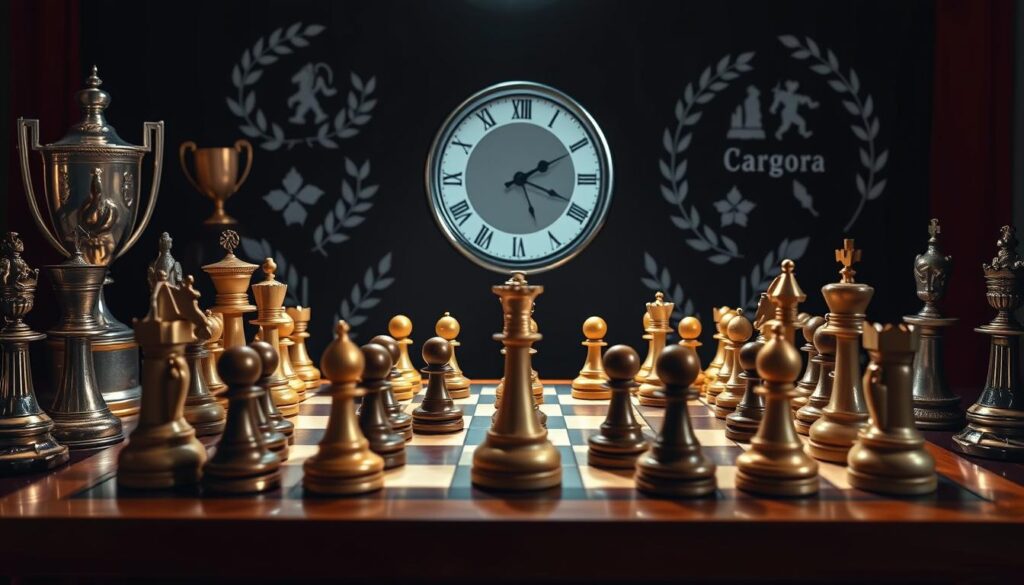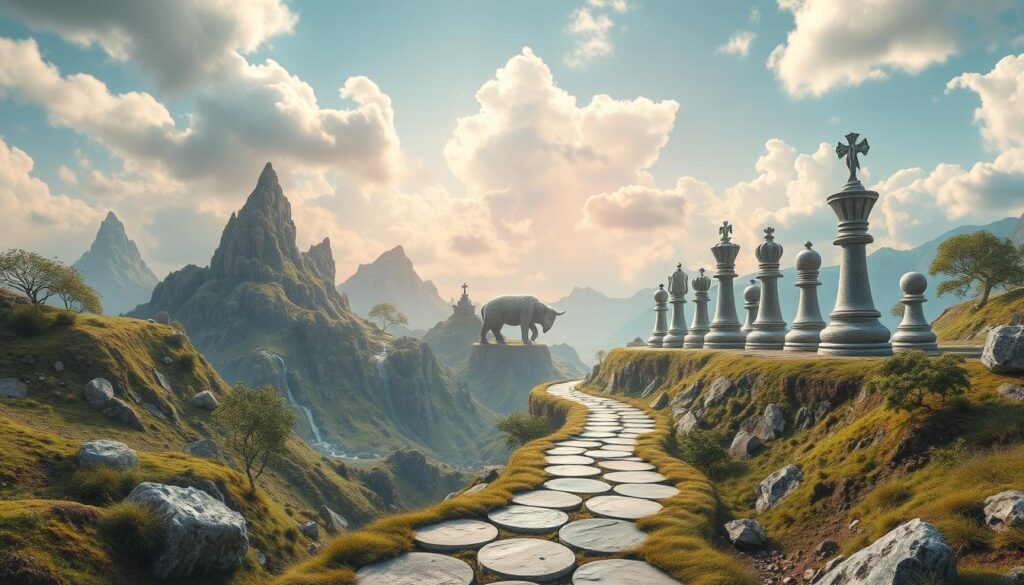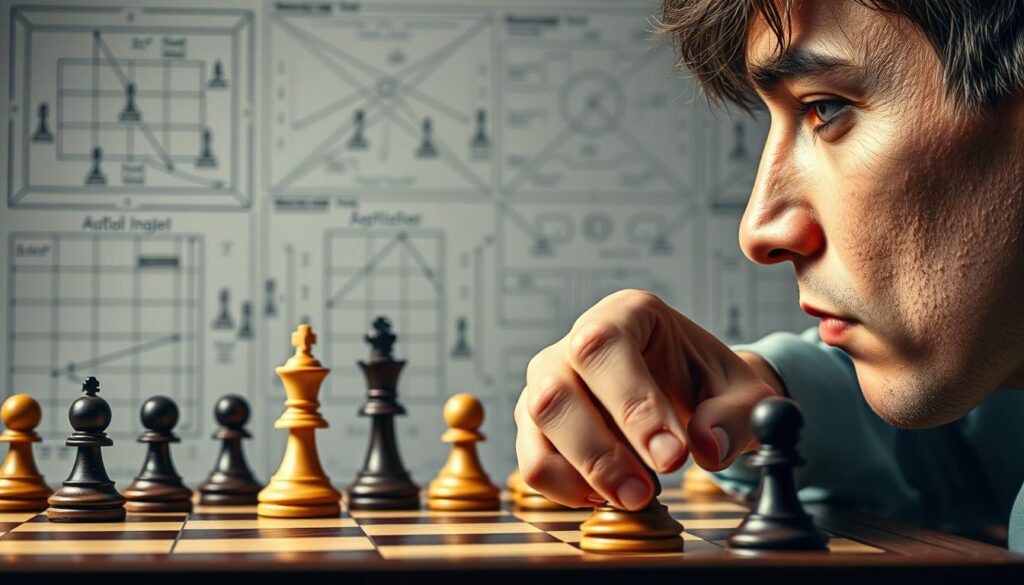Are you ready to take your chess game from amateur to pro? You could even become one of the youngest Grandmasters ever. Since 2018, six out of seven young players have earned their title, marking a thrilling time for chess.
Now, becoming a Grandmaster is easier than ever. Thanks to modern tech and sites like Chess.com, training has become more accessible. These tools offer great chances for players to grow their skills fast.
To become a GM, you need hard work, smart learning, and regular practice. It doesn’t matter if you’re young or an adult. The key is to keep improving and use advanced learning methods.
Table of Contents
Understanding the Chess Grandmaster Title Requirements

How to become a GM in chess ?
Getting the Grandmaster (GM) title is a big deal in chess. The International Chess Federation (FIDE) has strict rules for this title. These rules are tough, even for top players.
To get the GM title, you must excel in several areas:
- Get a FIDE rating of at least 2500
- Score three Grandmaster norms in international tournaments
- Show top-level strategic play consistently
The GM title requires you to be great in different types of chess games. You need to be good in classical, rapid, and blitz games. This shows you can adapt and think deeply strategically.
| Title | Rating Requirement | Global Count |
|---|---|---|
| Grandmaster (GM) | 2500+ | 1,813 total (1,772 men, 41 women) |
| International Master (IM) | 2400+ | 4,027 total (3,893 men, 134 women) |
| FIDE Master (FM) | 2300+ | 8,829 total (8,775 men, 54 women) |
Note: Getting the GM title is very rare. Less than 2,000 players worldwide have this honor.
Becoming a Grandmaster takes a lot of hard work, smart thinking, and winning in big international games. Each norm you get is a big step in your chess career. It shows you can play at the very top level.
The Journey From Beginner to Master: Setting Realistic Expectations(Chess Grandmaster Path)

Becoming a chess grandmaster is a tough journey. It needs patience, dedication, and a good plan. Your first step is to understand how skills grow and set reachable goals.
Begin by building a strong base. Chess success comes from steady growth, not quick wins. Most players start with low ratings and work their way up.
- Start by learning basic chess principles
- Practice regularly with players of various skill levels
- Study chess strategy and tactics
- Track your rating progress systematically
Your chess skills will grow in a usual way:
| Skill Level | Approximate Rating | Key Focus |
|---|---|---|
| Beginner | Below 800 | Basic rules and piece movements |
| Intermediate | 800-1200 | Basic strategies and tactical awareness |
| Advanced | 1200-1800 | Complex positional play |
| Expert | 1800-2200 | Advanced strategic thinking |
Remember, every grandmaster was once a beginner. Your commitment to learning and practicing will determine your success in chess.
Essential Technical Skills for Aspiring Grandmasters

To become a grandmaster, you need a solid plan for improving your chess skills. Your path to becoming a top player involves learning many chess areas.
Key skills for aspiring grandmasters include:
- Advanced opening theory comprehension
- Complex middlegame position analysis
- Precise endgame technique
- Tactical calculation abilities
- Strategic positional understanding
Chess GM training tips stress the need for deep skill growth. Studying key areas like pawn structures and space control can boost your game.
| Skill Category | Key Focus Areas | Recommended Study Method |
|---|---|---|
| Opening Preparation | Theoretical variations | Systematic database study |
| Middlegame Strategy | Position evaluation | Grandmaster game analysis |
| Endgame Technique | Precise calculation | Targeted practice scenarios |
Professional resources like ChessBase and specialized courses can help you grow faster. Regular practice and self-analysis are key to improving your chess.
Building Your Professional Chess Career
Starting a professional chess career needs careful planning and hard work. Your journey to becoming a chess grandmaster is more than just playing games. It’s about growing and being seen in the chess world.
Here are some key steps to achieve GM in chess to become a chess grandmaster:
- Play in tournaments often
- Use chess platforms online
- Make chess lessons or videos
- Meet other chess players
- Look for sponsors
Platforms like Chess.com and Chessable are great for aspiring grandmasters. They offer training, tournament links, and a chance to meet chess fans worldwide. By using these sites, you can show off your skills and find coaches or sponsors.
Think about making your chess career more varied:
- Do chess commentary or streaming
- Coach chess
- Make chess lessons or videos
- Join chess clubs
Success in chess careers comes from never giving up, always getting better, and networking well. Your plan to become a chess grandmaster should include learning, improving, and making a strong chess brand.
How to Become a GM in Chess: The Strategic Roadmap
Becoming a chess grandmaster is a big goal that needs a clear plan. Your path to GM status includes many steps. It’s tough but doable with the right plan and hard work.
Here are the main parts of becoming a chess grandmaster guide and chess grandmaster path:
- Develop a Comprehensive Training Plan
- Practice tactical exercises every day
- Learn endgame techniques
- Study games of grandmasters
- Tournament Participation Strategy
- Play in local tournaments
- Go for national and international events
- Work on getting FIDE norms
The journey to becoming a grandmaster is tough. Chess.com and Chessable are great resources. Coaches say you need to spend 4-6 hours a day on chess training.
| FIDE Title | Required Elo Rating | Norms Needed |
|---|---|---|
| Candidate Master (CM) | 2200 | None |
| FIDE Master (FM) | 2300 | None |
| International Master (IM) | 2400 | 3 Norms |
| Grandmaster (GM) | 2500 | 3 Norms |
GM Arturs Neiksans says learning never stops. It takes about 8.5 years to become a grandmaster. You need patience, hard work, and skill.
Mental Conditioning for High-Level Chess
Reaching grandmaster level in chess is not just about technical skills. Your mental game is key. It’s what sets top players apart from others. Getting ready mentally is crucial for the intense chess world.
Chess GM training tips show that mental conditioning is important. It involves several key strategies:
- Develop robust emotional resilience
- Practice visualization techniques
- Create consistent pre-game routines
- Master stress management skills
Visualization is a powerful mental training technique. Top players spend a lot of time mentally rehearsing. They imagine different scenarios and plan their moves before the game starts.
Your mental approach is key to performing well under pressure. Top players know that controlling emotions is as important as knowing tactics. They learn to handle anxiety, deal with setbacks, and stay focused during long games.
| Mental Skill | Training Approach | Expected Outcome |
|---|---|---|
| Concentration | Meditation practices | Enhanced focus during matches |
| Emotional Control | Breathing techniques | Reduced performance anxiety |
| Strategic Thinking | Mental simulation | Improved decision-making |
Players like Christopher Yoo show how emotional awareness can change the game. The 4-7-8 breathing technique is great for managing stress. It helps players stay calm and strategic, even when it’s tough.
Adding mental conditioning to your chess training will change how you play. It will help you master the mental side of the game.
Technology and Tools for Advanced Chess Training
To improve at chess, you need to use the latest technology. Modern training tips use advanced digital tools to speed up your learning. Top players use software and online platforms to get better at strategy.
Technology has changed how we train for chess. It helps you analyze games, track your progress, and explore new strategies.
- Chess Engines for Precise Analysis
- Stockfish for deep position evaluation
- Analyze complex game scenarios
- Identify tactical and strategic opportunities
- Online Training Platforms
- Chess.com’s Vision features
- AimChess interactive training
- Personalized skill development programs
Chess databases like Chessbase hold a vast collection of games. They let you create your own database, study grandmaster games, and see how you’ve grown.
| Technology | Key Benefits | Recommended For |
|---|---|---|
| AI Training Programs | Dynamic skill challenge | Advanced players |
| Chessable | Spaced repetition learning | All skill levels |
| Chess Engines | Precise game analysis | Competitive players |
Remember, technology is a tool – your dedication and strategic thinking remain the most critical components of chess mastery.
Financial Aspects of Pursuing the GM Title(chess grandmaster path)
Starting a chess career means you need to plan your money carefully. The journey to becoming a Grandmaster (GM) is filled with big costs. You’ll face many expenses that need smart budgeting and creative money management.
Here are some key money matters for chess players:
- Tournament entry fees
- Travel and accommodation expenses
- Professional coaching costs
- Training materials and resources
- Online chess platform subscriptions
To fund your chess path, you need to think outside the box. Here are some financial ideas:
- Apply for chess scholarships
- Seek potential sponsorships
- Launch crowdfunding campaigns
- Balance part-time work with chess training
Managing chess finances can be tough, but it’s doable. Maurice Ashley’s story shows how it can work. His chess fellowship got a $20,000 pledge, showing support for talented players.
Seeing your GM title pursuit as a long-term investment is key. Having different ways to make money while improving at chess can help you stay stable.
| Expense Category | Estimated Annual Cost |
|---|---|
| Tournament Fees | $5,000 – $10,000 |
| Travel Expenses | $3,000 – $7,500 |
| Coaching | $2,000 – $5,000 |
| Training Resources | $1,000 – $2,500 |
By knowing and managing your chess finances well, you can make your GM title dream a reality.
Common Challenges and How to Overcome Them
Becoming a chess grandmaster is a tough journey. Many players face big obstacles that can stop them. It’s key to know these challenges to grow strong and improve wisely.
Beating chess hurdles needs a smart plan. Here are main challenges you might meet:
- Mental fatigue during long tournaments
- Plateaus in skill development
- Competitive pressure and performance anxiety
- Balancing chess training with personal life
Statistics show that 90% of chess players struggle to improve effectively. This fact highlights the need for a solid plan for growth and skill boost.
Chess grandmaster path
| Challenge | Potential Solution |
|---|---|
| Skill Plateau | Diversify training methods, seek expert feedback |
| Tournament Stress | Practice relaxation techniques, mental conditioning |
| Motivation Decline | Set intermediate goals, celebrate small achievements |
Having a strong support system is vital. Connect with other chess fans, find mentors who get the game, and talk openly with family for emotional support.
Every grandmaster has faced these challenges. Your ability to keep going, learn, and adapt will decide your success in chess.
Conclusion: Chess Grandmaster path To Success
Becoming a chess grandmaster is a huge achievement in your chess career. With only 2000 Grand Masters worldwide, it’s a goal that requires a lot of hard work and dedication. It’s not just about being good at chess; it’s about mastering the game’s complex strategies.
Success in chess comes from never stopping to learn and prepare. Knowing the tough requirements, like getting a FIDE rating of 2500 and three Grand Master Norms, helps you face the challenges of competitive chess. Top players know that becoming a grandmaster is about steady progress, not quick wins.
Improving your chess skills means getting better at technical moves, staying mentally sharp, and using new training tools. By focusing on your game, playing in tournaments, and learning from the best, you’ll get closer to becoming a grandmaster. Every game and every study session brings you closer to your chess dreams.
The journey to becoming a grandmaster is tough but very rewarding. Keep your passion for chess alive, stay open to new ideas, and keep pushing your limits. Your hard work and dedication will lead you to success in this amazing intellectual challenge.
FAQ
How long does it take to become a Chess Grandmaster?
Becoming a Chess Grandmaster takes 10-15 years of hard work. Most start young and spend thousands of hours studying and playing. The time it takes depends on talent, how much you practice, and access to good coaches.
What is the minimum rating required to become a Grandmaster?
You need a FIDE rating of at least 2500 to become a Grandmaster. You also need to earn three Grandmaster norms in international tournaments. These norms show you can play at a very high level against other top players.
How expensive is the path to becoming a Chess Grandmaster?
The journey to becoming a Grandmaster can be costly. You’ll spend money on tournament fees, travel, coaching, and training materials. The cost can be between ,000 and ,000 a year. Many players look for sponsorships or scholarships to help cover these costs.
What online resources are best for improving chess skills?
Chess.com, Chessable, YouTube chess tutorials, and ChessBase software are great resources. Chess.com offers lessons and tactical training. Chessable has interactive courses. YouTube channels by Grandmasters provide strategic insights. Chess engines like Stockfish can also help improve your game.
Can adults become Chess Grandmasters?
While most Grandmasters start young, adults can still improve a lot. Becoming a GM as an adult is very hard. Adults need to dedicate a lot of time to study, practice, and compete. The key is consistent training and understanding chess well.
What mental skills are crucial for becoming a Grandmaster?
To become a Grandmaster, you need great concentration, stress management, and calculation skills. Visualization and psychological resilience are also important. Players must focus well, manage pressure, and bounce back from losses. Mindfulness and meditation help a lot.
How important is coaching in becoming a Chess Grandmaster?
Coaching is very important on the path to becoming a Grandmaster. A good coach can tailor training, improve weaknesses, and teach advanced techniques. Many top players work with several coaches to cover different areas of the game.

















